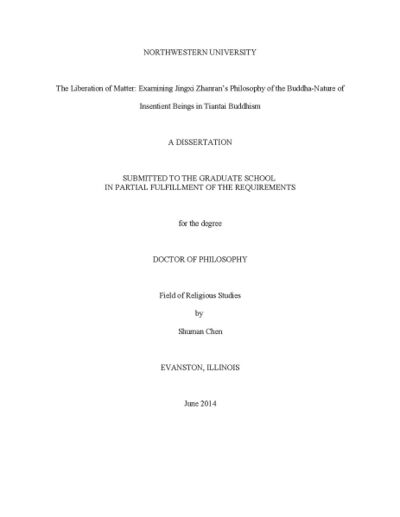The Liberation of Matter: Examining Jingxi Zhanran’s Philosophy of the Buddha-Nature of Insentient Beings in Tiantai Buddhism
< Books(Redirected from The Liberation of Matter: Examining Jingxi Zhanran’s Philosophy of the Buddha-Nature of Insentient Beings in Tiantai Buddhism)
Abstract
This dissertation examines the notion that not only sentient beings but also insentient
ones, e.g., flora, mountains, rivers, and manmade objects, have Buddha-nature. Employing an
exegetical approach, I investigate Jingxi Zhanran’s (711-782) theory of the Buddha-nature of
insentient beings. Emphasizing the all-pervasiveness of Buddha-nature and the nonduality of
mind and material, he eliminates the absolute distinction between sentient and insentient beings
and contends that Buddha-nature includes all beings. Additionally, insisting on the Tiantai notion
of mutual inclusion, which reveals a two-way relationship between sentience and insentience,
Zhanran reverses the positions of the subjective observer and the objective phenomenon,
subjectifying insentient beings.
In addition to examining the theoretical profundity of Zhanran’s theory, my study examines the issues of sentience versus insentience and Buddha-nature that took place before Zhanran and discusses the subsequent Tiantai concerns with the Buddha-nature of insentient beings. Through textual analysis, I reexamine the emergence of the Chinese thought that connects Buddha-nature to insentient things, initially presented by Jingying Huiyuan (523-592) and Jiaxiang Jizang (549-623). I also illustrate that the concept of the Buddha-nature of insentient beings is implied in Zhiyi’s (538-597) thought by interpreting Zhiyi’s teachings that inspired Zhanran’s advocacy. Furthermore, I analyze, on doctrinal grounds, Chinese Tiantai descendants’ endorsement of Zhanran’s theory, contrasting it with their Japanese counterparts’, the latter who found it difficult to conceptualize how insentient beings’ spiritual cultivation might occur.
I ultimately argue that Zhanran, indeed, articulates the Buddhahood of insentient beings, and that the modality of their practice through the nonduality between passivity and activity, and between Buddhahood and “insentienthood” can be explained. By raising questions about the human relation to the insentient world and exploring possibilities for attaining harmony through transcending the duality between selfness and otherness, and subjectivity and objectivity, I hope to contribute to the reexamination of anthropocentric religious liberation.
| Citation | Chen, Shuman. "The Liberation of Matter: Examining Jingxi Zhanran’s Philosophy of the Buddha-Nature of Insentient Beings in Tiantai Buddhism." PhD diss., Northwestern University, 2014. |
|---|---|

